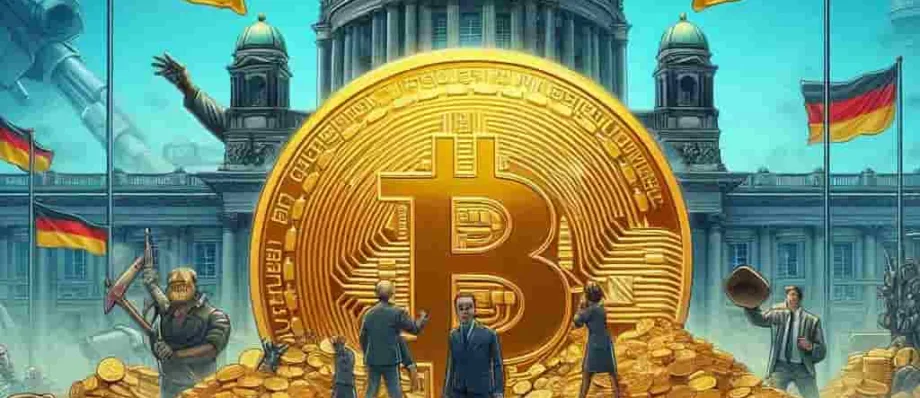German Government Buys Back $111.5M Worth of Bitcoin After Massive Sell-Offs
In a surprising reversal, the German government, known for its recent large-scale Bitcoin sell-offs, has just repurchased a significant amount of BTC. Data from Arkham Intelligence reveals a purchase of 1,915 BTC, worth $111.5 million, from major exchanges Kraken, Bitstamp, and Coinbase. This move comes after weeks of high-profile Bitcoin sales by the German government, which had sparked market volatility and raised questions about their crypto strategy. The sudden buyback has ignited speculation and renewed optimism among Bitcoin investors worldwide.
Key Takeaways
- Germany’s Bitcoin Movements: From large-scale sell-offs to a strategic buyback of 1,915 BTC.
- Market Impact: Significant price fluctuations and reactions from the crypto community.
- Strategic Implications: Comparing Germany’s approach with other nations like El Salvador.
- Future Predictions: Assessing the broader impact on market stability, governmental strategies, and investor confidence.
Table of Contents
The Timeline of Germany’s Bitcoin Movements
Initial Sell-Offs
Since June 19, the German government has been selling BTC tokens to external addresses, particularly to exchanges like Coinbase, Kraken, and Bitstamp, for liquidation. Initially, the government held 45,609 Bitcoin, valued at around $2.81 billion. Data from Arkham Intelligence reveals Germany now holds 41,226 BTC ($2.3B).
Market Impact of the Sell-Offs
During this period, Bitcoin’s market value fell by 18.23%, from a high of $65,695 on June 19 to $53,717 on July 5. This massive Bitcoin price drop significantly affected the broader altcoin market, which witnessed even steeper losses under the same timeframe. The sell-offs raised concerns and criticism from various quarters, including German parliament member Joana Cotar, who described the sales as irrational and urged the government to “hold BTC as a strategic reserve currency.”
Sudden Buyback and Market Reactions
In a dramatic turn, the German government purchased 1,915 BTC, worth $111.5 million, from major exchanges. This unexpected buyback has sparked speculation and renewed optimism among Bitcoin investors. The government’s wallets received 1,915 BTC last night, and this morning, 1,047.4 BTC was transferred out, valued at $57.2 million. A significant portion, 547.4 BTC, valued at $30.1 million, was transferred to Flow Traders, while another 500 BTC, worth $27.1 million, is believed to have been sent for institutional or OTC services.
The Broader Context
Previous Transfers and Market Volatility
This is not the first time the German Government has made significant moves in the crypto market this month. On Tuesday, they transferred 832.7 Bitcoins, valued at approximately $52 million, with 282.7 Bitcoins sent to major exchanges such as Bitstamp, Coinbase, and Kraken. Two days later, the government made another massive transfer of 3,000 Bitcoins, worth approximately $174 million. Amid these inflows and outflows, the government wallet now holds 40,526 BTC worth over $2.29 billion.
Reactions from the Crypto Community
The crypto community has been quick to react to these movements. Justin Sun, founder of Tron (TRX), expressed his intention to negotiate with the German Government to minimize the impact of their sales on the market. Sun suggested that an off-market transaction could prevent significant price fluctuations, aiming to find a solution that benefits all parties involved.
Strategic Implications
Germany’s Evolving Crypto Strategy
Germany’s recent actions indicate a possible shift in its crypto strategy. The initial sell-offs seemed to signal a lack of confidence in Bitcoin as a reserve asset, leading to market volatility and criticism from various stakeholders. However, the sudden buyback suggests a more nuanced approach, possibly aiming to stabilize their holdings and take advantage of lower prices following the market dip.
Comparisons with Other Nations
Germany’s strategy can be contrasted with that of El Salvador, which continues to acquire Bitcoin aggressively. El Salvador’s president, Nayib Bukele, has committed to buying 1 BTC daily, viewing it as a long-term strategic reserve. This approach is designed to boost the country’s financial independence and economic stability. In contrast, Germany’s actions appear more reactive, responding to market conditions and political pressures.
Market Analysis and Future Predictions
Current Market Trends
The crypto markets seemed to recover slightly on July 6 despite the recent volatility. Bitcoin’s price increased by approximately 2.35%, retesting the $57,000 level. The crypto market also showed a general upward trend, with the global market cap increasing by over 2% in the past 24 hours. These movements suggest that the market may be stabilizing following the initial shock of Germany’s sell-offs and subsequent buyback.
Long-Term Implications
The long-term implications of Germany’s Bitcoin movements are multifaceted. Key factors include market stability, governmental strategies, and investor confidence.
Market Stability: The sell-off tested the market’s resilience. If Bitcoin can maintain stability and recover from the dip, it could reinforce confidence in its long-term viability.
Governmental Strategies: Other governments may look to Germany’s decision as a case study when considering their own crypto strategies. This move could influence global regulatory approaches and market behaviors.
Investor Confidence: The reaction of institutional and retail investors will be crucial. If confidence remains strong, the market can continue to grow and innovate. However, prolonged uncertainty could deter new investments.
The Role of Institutional Players
Flow Traders and Institutional Services
The involvement of Flow Traders and other institutional services in the recent transactions highlights the growing role of institutional players in the crypto market. These entities provide liquidity and stability, helping to mitigate the impact of large transactions on market prices. The transfer of 547.4 BTC to Flow, Traders, indicates that Germany is leveraging these services to manage their holdings more effectively.
Potential for Future Off-Market Transactions
Justin Sun’s proposal for off-market transactions represents a potential strategy for reducing market volatility. By conducting large transactions privately, governments and large holders can avoid significant price fluctuations, benefiting both the market and the stakeholders involved. This approach could become more common as the crypto market matures and institutional involvement increases.
Conclusion
Germany’s recent Bitcoin movements, from large-scale sell-offs to a sudden buyback, have created a stir in the crypto world. These actions highlight the complex interplay between government decisions and market reactions. While the immediate impact has been notable, the long-term effects will depend on various factors, including market stability, regulatory responses, and investor confidence. As the crypto market continues to evolve, events like this serve as critical reminders of the unpredictability and potential of digital currencies.



